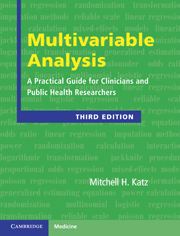Book contents
- Frontmatter
- Contents
- Preface
- 1 Introduction
- 2 Common uses of multivariable models
- 3 Outcome variables in multivariable analysis
- 4 Independent variables in multivariable analysis
- 5 Relationship of independent variables to one another
- 6 Setting up a multivariable analysis
- 7 Performing the analysis
- 8 Interpreting the results
- 9 Delving deeper: Checking the underlying assumptions of the analysis
- 10 Propensity scores
- 11 Correlated observations
- 12 Validation of models
- 13 Special topics
- 14 Publishing your study
- 15 Summary: Steps for constructing a multivariable model
- Index
- References
2 - Common uses of multivariable models
Published online by Cambridge University Press: 01 April 2011
- Frontmatter
- Contents
- Preface
- 1 Introduction
- 2 Common uses of multivariable models
- 3 Outcome variables in multivariable analysis
- 4 Independent variables in multivariable analysis
- 5 Relationship of independent variables to one another
- 6 Setting up a multivariable analysis
- 7 Performing the analysis
- 8 Interpreting the results
- 9 Delving deeper: Checking the underlying assumptions of the analysis
- 10 Propensity scores
- 11 Correlated observations
- 12 Validation of models
- 13 Special topics
- 14 Publishing your study
- 15 Summary: Steps for constructing a multivariable model
- Index
- References
Summary
What are the most common uses of multivariable models in clinical research?
The four most common uses of multivariable models are:
A observational studies of etiology
B intervention studies (randomized and nonrandomized)
C studies of diagnosis
D studies of prognosis
These different uses are discussed in the Sections 2.2–2.5.
How is multivariable analysis used in observational studies of etiology?
The goal of etiologic studies is to identify causes of an outcome, usually with the goal of removing a harmful substance (e.g., tobacco) or promoting a healthful activity (e.g., exercise).
Although observational studies cannot prove causality, multivariable analysis may strengthen the argument for causality by excluding confounding, an alternative explanation of an association. Look back at the example of fitness and mortality in Chapter 1. If the association between fitness and longevity is causal, encouraging people to exercise more will extend their life. If the association between fitness is confounded by smoking (i.e., smoking is the real cause of the decreased lifespan, and because smokers exercise less it appears that fitness is associated with longevity) increasing fitness will not change longevity. The data in Table 1.2 indicate that the effect of fitness on longevity is not confounded by smoking or other factors (at least not the ones the authors adjusted for) and therefore fitness programs are a promising intervention for extending survival.
Information
- Type
- Chapter
- Information
- Multivariable AnalysisA Practical Guide for Clinicians and Public Health Researchers, pp. 14 - 24Publisher: Cambridge University PressPrint publication year: 2011
